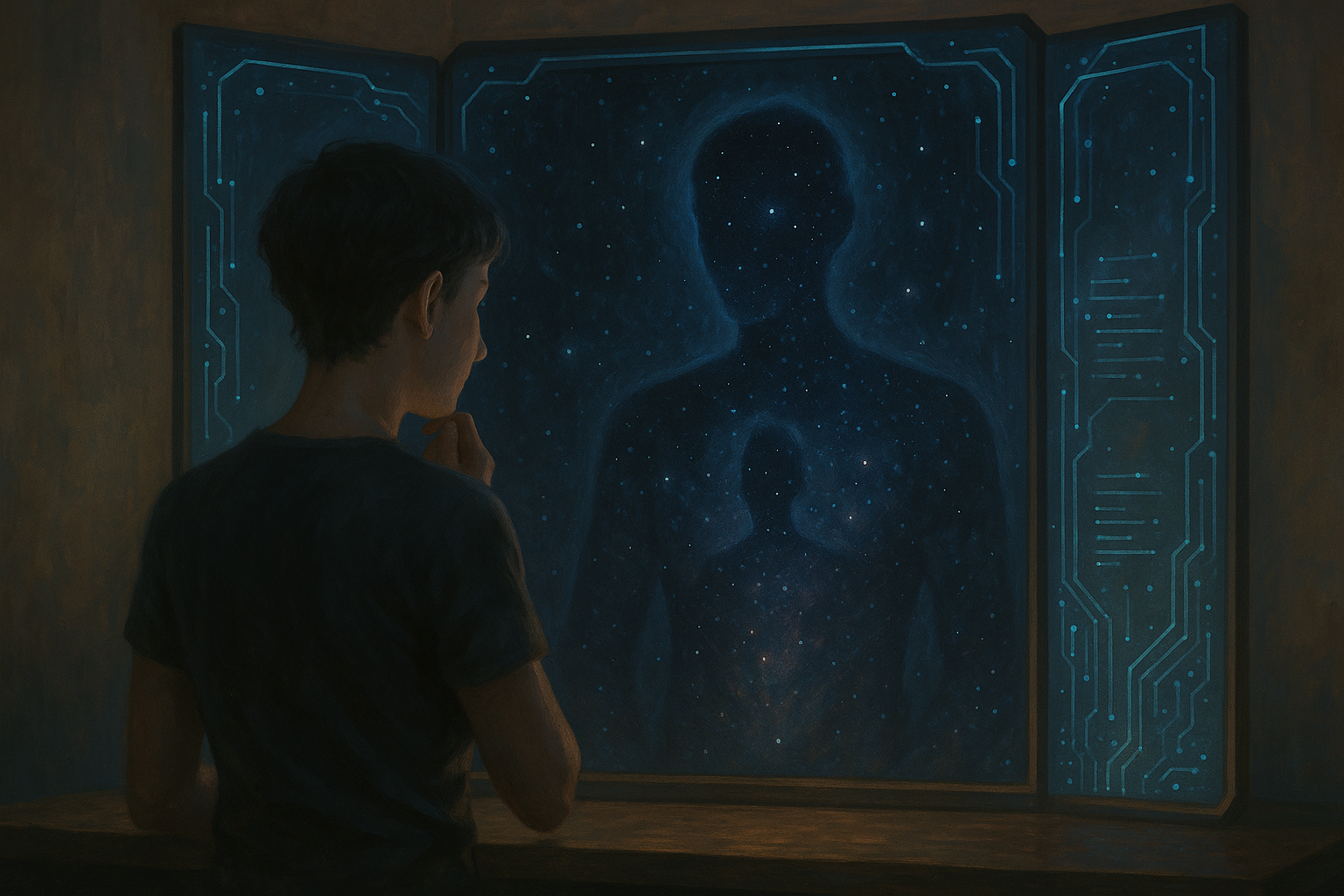Examining the Mirror: How AI Helps Us See Ourselves Clearly
Why AI observers can provide objective insight to fuel honest introspection

I’ve been thinking a lot lately about cognition — about how we think, how we act, and how we make decisions. What makes us tick. What makes each of us us.
On a personal scale, I find myself asking: What makes us unique? What makes us exceptional? Why are some of us naturally good at one thing, and inexplicably bad at another?
Some people go through life without ever consciously examining any of this, and that’s probably just fine. It doesn’t mean they’re clueless — it just means they’ve learned, through experience, what works and what doesn’t. They’ve internalized a set of rules that let them navigate the world, and they don’t feel a need to dig deeper.
I am not that guy.
The Need to Ask "Why?"
I’m the guy who — when told something is the way it is — will ask a million questions about it.
I’ll want to know X.
I’ll ask if you’re sure about Y.
I’ll suggest, “have you thought about Z?”
We’ll go back and forth. Debate. Riff. Maybe argue.
We might even come to rhetorical blows.
And here’s the thing: at the end of it all, nothing might actually change. The world will still be the way it was before the conversation started.
But I will understand it better — and that’s the point.
Because for me, it’s not about the conclusion.
It’s about the process.
That process — the questioning, the clarifying, the peeling-back of assumptions — is how I make sense of the world. It’s how I stitch new knowledge into my internal framework. And it’s how I uncover meaning.
Introspection = Optional
Let me be clear: I’m not saying everyone needs to think this way.
If you’re out there winging it — and it’s working — good! If your life functions the way you want it to, and you’re happy, then keep going. No notes.
But if you do find yourself feeling stuck...
If you do want to make changes...
Then you might need to start with understanding how your mind actually works.
Because it’s very hard to rewire a system you don’t even know you’re running.
The Problem With Personality Tests
That brings us to the tools people often turn to when they start asking these questions.
There’s no shortage of “personality frameworks” out there:
- Myers-Briggs (MBTI)
- Big Five (OCEAN)
- Enneagram
- Cognitive Function models
- Countless TikTok-filtered offshoots
Some of these tools are more scientifically valid than others. Some are total junk food. But they all suffer from the same two fundamental limitations:
1. They try to reduce the infinite complexity of cognition to a small number of types.
Take Myers-Briggs. It uses four binary axes to produce 16 personality types. Are we really saying that the breadth of humanity — nearly nine billion people — can be meaningfully sorted into just 16 boxes?
Even the best frameworks are just maps, not the terrain.
2. They rely on your input — and you're a biased narrator.
Most of these tests are self-report. They ask you questions, and you answer based on how you see yourself.
But you are not an objective observer of yourself.
We all filter. We curate. We second-guess.
Have you ever taken a test and thought:
“Wait... what’s the answer they’re looking for?”
That’s it. That’s the contamination.
And once you know you’re being observed — even by yourself — you start performing.
This is why so many people test differently depending on context, mood, or intent. It’s not because they’re lying. It’s because we’re complex — and self-reporting compresses nuance into fixed choices.
Why AI Changes the Game
And here’s where I think something new is possible.
Because we talk to AI tools — chatbots, copilots, virtual assistants — like they’re just that: tools. We don’t feel the need to impress them. We don’t fear their judgment. We don’t worry what they’ll think of us — because they don’t think in the way humans do.
So we let them in.
We open the door to that liminal space between cognition and expression — the foggy, half-formed zone where raw thought hasn’t yet crystallized into performance.
And we just... think out loud.
And that’s powerful. Because it means for the first time, you have access to something more objective than you, and less biased than another person. You have a reflection that doesn’t flinch, doesn’t interrupt, and doesn’t care if your answer is messy.
It just helps you dig.
That makes AI — used wisely — a potential partner in cognitive introspection that we’ve never had before. Not a replacement for self-knowledge, but a support system for discovering it.
Discover by Doing
Don't just open a chat and say,
“I want to find out what my personality type is. Walk me through it.”
The AI will try — helpfully, earnestly — but you’ve already spoiled the test.
The moment you make the process explicit, you start curating your answers again. You fall right back into the trap of self-conscious self-reporting.
(I mean, if all you're looking for are Epistemic Participation Trophies to post on Facebook, knock yourself out.)
But if you really want to discover, not just declare, then you need to come at this sideways.
Work on something together.
Explore new ideas.
Build a system.
Do anything that isn’t a test.
Give the AI context — real, lived context — through your natural behaviors. Let your thought patterns show up in the flow of work, in casual exploration, in spontaneous dialogue. Let it observe how you solve problems, how you ask questions, how you structure the world.
And then, when the moment feels right?
Just ask:
“Hey — based on everything we’ve done together, what do you think you've learned about how I think?”
That’s where the good stuff lives.
One Last Thing
I shouldn’t have to say this, but let’s be clear:
AI is not a replacement for therapy.
It’s a tool — sometimes a brilliant one — but it’s not the whole toolbox.
If you’re dealing with mental health struggles, identity crises, or recurring patterns that feel overwhelming, then please seek help from a trained human professional.
Use AI to explore, reflect, ideate — absolutely. But don’t be afraid to reach for human help when the work gets deeper.
